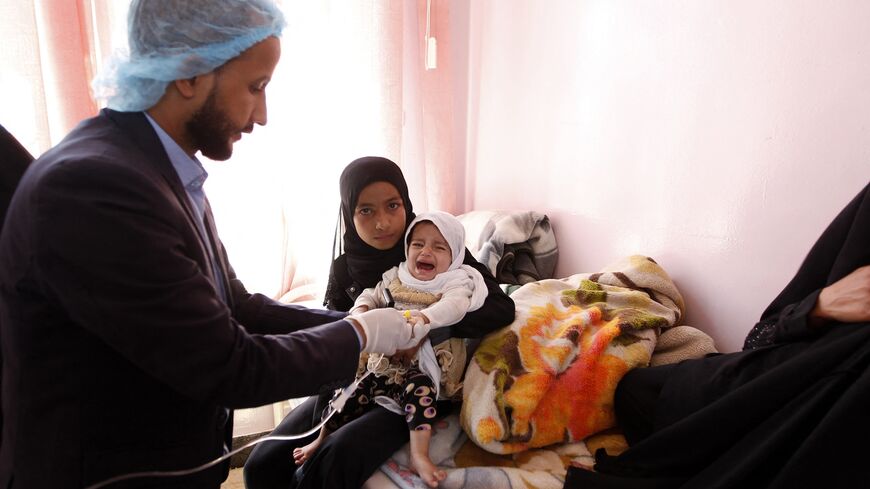A Houthi official in Yemen called this week for the resumption of food aid distribution in the war-torn country to ward off “dangerous stages of famine,” as Yemen experiences one of the world’s worst humanitarian crises.
The request came during a meeting in Sanaa on Wednesday between Markus Werne, director of the UN Office for the Coordination of Humanitarian Affairs (OCHA) in Yemen, and Ibrahim al-Hamli, head of the Houthi-affiliated Supreme Council for Management and Coordination of Humanitarian Affairs and International Cooperation.
“The suspension of food aid has exacerbated humanitarian suffering, leading to an increase in food insecurity and cases of malnutrition among the displaced people, especially children,” Hamli warned, according to the Houthi-run Saba news agency.
Werne stressed that the United Nations is working to mobilize the funds needed to resume food aid distribution in Yemen and praised the Supreme Council for facilitating the work of aid organizations operating in Yemen.
In December, the World Food Programme announced the suspension of its assistance to Houthi-controlled areas after disagreement over the WFP's plan to reduce the number of people benefitting from its assistance from 9.5 million to 6.5 million due to a lack of funding.
The World Health Organization (WHO) has repeatedly warned of alarmingly high levels of malnutrition in Yemen. According to figures by the UN agency, an estimated 5 million children in the country are acutely malnourished, with around 6.1 million people on the verge of famine.
The United Nations has renewed its warnings of food insecurity plaguing Yemen.
Edem Wosornu, director of operations and advocacy at OCHA, told the UN Security Council on Monday that despite some relief registered during the Muslim holy month of Ramadan, thanks to charities, remittances and community-led initiatives, more is needed to prevent a worsening of food and nutrition security in the country.
Speaking on behalf of OHCA chief Martin Griffiths, Wosornu called on the UN and its partners to exert more effort to help “keep hunger at bay.”
UN agencies have repeatedly warned of the deteriorating humanitarian situation in Yemen and its impact on the civilian population.
As of March, a staggering 21.6 million Yemenis — two-thirds of the country's total population of 34 million — was in need of some form of humanitarian assistance, according to data compiled by OCHA, UNHCR, the UN Refugee Agency, and other UN organizations.
Fighting between forces loyal to the government and Houthi rebels, including airstrikes, have led to the collapse of the country’s economy and infrastructure as well as the healthcare system, on the whole obstructing access to basic services. Nearly 50% of health facilities in Yemen are currently out of service, according to the International Committee of the Red Cross. This dire situation has facilitated the spread of several vaccine-preventable diseases, including cholera, polio and measles.
Cholera cases surge
Wosornu further expressed his concerns to the Security Council over the “alarming resurgence of cholera” cases in Yemen, specifically in Houthi-held territories, since last October.
In his speech to the council on Monday, he said the Yemeni government’s response to the cholera surge in its areas of control has helped slow the spread of the disease and ensure treatment, but cases in areas controlled by the Houthi rebels have “spread rapidly.”
“As of April 7, more than 11,000 suspected cases have been reported in these [Houthi] areas with 75 associated deaths,” he warned. In comparison, about 3,200 suspected cases have been reported in government-controlled areas since October.
Wosornu called on the international community to support the United Nations to secure much-needed funding and supplies to help curb the spread of cholera.
Since 2016, when the first cholera outbreak was reported in Yemen, more than 2.5 million suspected cases have been reported, according to WHO, including nearly 4,000 related deaths.
Yemen has long been one of the poorest countries in the Arab world, even before the civil war erupted in 2014. Now, the United Nations estimates that more than 80% of the population lives below the poverty line.
Yemeni government forces and Houthi rebels became embroiled in conflict after the rebels took control of the capital, Sanaa, and toppled President Abed Rabbo Mansour Hadi and his government, which eventually regrouped in the southern city of Aden.
The conflict quickly turned into a proxy war between Iran and Saudi Arabia, which has been leading an Arab military coalition in support of the internationally recognized government fighting the Iran-backed Houthis since 2015. The war has left more than 130,000 people dead, while forcing some 4.5 million into internal displacement, according to data from UN agencies.
Although the fighting has largely subsided since a UN-brokered agreement was reached in April 2022, the Houthis have been targeting commercial shipping vessels in the Red Sea since October in response to Israel’s offensive against Hamas in the Gaza Strip.
The Houthis' repeated drone and missile attacks have prompted a series of US airstrikes against Houthi-linked targets in Yemen.



